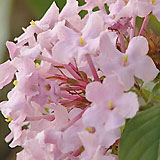Luculia
In winter some of the most gorgeous perfumed plants flower, including daphne (Daphne odora), winter honeysuckle (Lonicera fragrantissima) and the shrub that Peter Valder looked at in our segment, the luculia (Luculia gratissima). It has rose pink flowers with a strong perfume, which is often described as being somewhere between a gardenia and a vanilla fragrance.
Plant details
Common name: Luculia
Botanic name: Luculia gratissima
The genus name, Luculia, is the Latinised form of the Nepalese name, Luculi Swa. The species name, gratissima, is Latin for ‘most pleasing’.
Description: Luculias are evergreen shrubs with rounded, often irregular growth habits. In the wild they are said to reach 6m (20′), but in cultivation they are usually around the 3-4m (9-12′) mark. In winter scented, pink flowers appear on the ends of the stems, in large clusters up to 20cm (8″) across.
Best climate: Mountain zones where the frosts aren’t too severe, or cooler coastal areas of Australia. Protect young plants from frost.
Good points:
The flowers are exquisite. Not only do they look beautiful but they also have a lovely perfume.
Downside:
difficult to grow susceptible to phytophthora root rot flowers often ruined by rain and wind
Care:
Luculias grow well in a semi-shaded position (or a spot with protection from hot afternoon summer sun). A free-draining coarse soil with added organic material is best. They like a cool root zone, so keep the plant mulched. Do not let the soil dry out. Luculias resent root disturbance and don’t like to be transplanted. During prolonged periods of heavy rain, spraying the foliage with a phosphorous acid product such as Yates Anti Rot may help prevent root rot. Shoots that have been damaged by frost can be cut back to a pair of healthy leaves or buds in late winter to early spring, when the chance of frost is past. A light prune to remove spent flowers at this time will also help to shape the plant and keep it bushy. Luculias benefit from the occasional application of a small amount of lime, except in areas such as Adelaide or Perth which have alkaline soils.
Getting started:
Luculias can be propagated from seed or semi-hardwood cuttings in summer (semi-hardwood cuttings are tip cuttings that have just started to harden off). Luculias are also available at most nurseries in areas where they grow, while they are in flower (usually from late autumn to July). They cost around $14 for plants in 150mm (6″) pots, and $20 for 200mm (8″) pots. Yates Anti Rot is available at most nurseries, and costs about $12 for 500ml. For enquiries about Yates products, phone: 1800 224 428.



